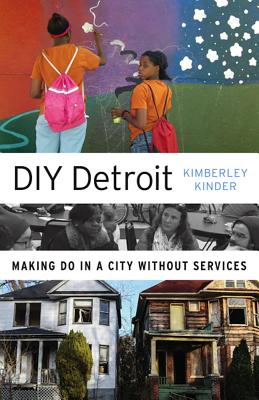

 University of Minnesota Press
University of Minnesota Press
DIY Detroit: Making Do in a City Without Services


Key Metrics
- Kimberley Kinder
- University of Minnesota Press
- Paperback
- 9780816697090
- 8.4 X 5.4 X 0.6 inches
- 0.7 pounds
- Social Science > Regional Studies
- English
 Secure Transaction
Secure TransactionBook Description
For ten years James Robertson walked the twenty-one-mile round-trip from his Detroit home to his factory job; when his story went viral, it brought him an outpouring of attention and support. But what of Robertson's Detroit neighbors, likewise stuck in a blighted city without services as basic as a bus line? What they're left with, after decades of disinvestment and decline, is DIY urbanism--sweeping their own streets, maintaining public parks, planting community gardens, boarding up empty buildings, even acting as real estate agents and landlords for abandoned homes.
DIY Detroit describes a phenomenon that, in our times of austerity measures and market-based governance, has become woefully routine as inhabitants of deteriorating cities domesticate public services in order to get by. The voices that animate this book humanize Detroit's troubles--from a middle-class African American civic activist drawn back by a crisis of conscience; to a young Latina stay-at-home mom who has never left the city and whose husband works in construction; to a European woman with a mixed-race adopted family and a passion for social reform, who introduces a chicken coop, goat shed, and market garden into the neighborhood. These people show firsthand how living with disinvestment means getting organized to manage public works on a neighborhood scale, helping friends and family members solve logistical problems, and promoting creativity, compassion, and self-direction as an alternative to broken dreams and passive lifestyles.
Kimberley Kinder reveals how the efforts of these Detroiters and others like them create new urban logics and transform the expectations residents have about their environments. At the same time she cautions against romanticizing such acts, which are, after all, short-term solutions to a deep and spreading social injustice that demands comprehensive change.
Author Bio
Kimberley Kinder is an Associate Professor of Urban and Regional Planning at the University of Michigan’s Taubman College of Architecture and Urban Planning. She is also the Faculty Director for the cross-disciplinary Healthy Cities Certificate Program. Her research focuses on the social, cultural, and political aspects of urban landscapes.
Kinder is the author of two books, and she has a third book forthcoming. Her most recent book, DIY Detroit: Making Do in a City without Services (University of Minnesota Press, 2016), explores how residents in Detroit cope with market disinvestment and government contraction by taking charge of abandoned landscapes. Residents sweep public streets, board empty buildings, mow vacant lots, and maintain city parks. They use landscape props to promote neighborhood safety, street-level photographs to advance community interests, and murals and gardens to create landscapes of hope. With the City of Detroit significantly weakened by long-standing fiscal crises, these self-provisioned, spatial interventions are crucial in resident efforts to stabilize blocks and exert social control over their neighborhoods.
Kinder’s first book, The Politics of Urban Water: Changing Waterscapes in Amsterdam (University of Georgia Press, 2015), explores how active residents in Amsterdam deploy waterscapes when rallying around a variety of political concerns. Redeveloped waterfronts are trademark landscapes in many post-industrial cities, and the market logics underlying these investments often dominate scholarly and media debates. However, in Amsterdam, squatters, queers, artists, historians, environmentalists, climatologists, tourists, reporters, and cabinet officials also bring waterscapes to life. Their interventions pull water in new directions, connecting it to political discussions about affordable housing, cultural tolerance, climate change, and national identity.
Kinder’s third book, The Radical Bookstore: Counter Space for Social Movements (University of Minnesota Press, forthcoming), explores how activists use spatial agency for organizing. Activists need autonomous space for organizing, and these spaces are made, not found. In this book, I use examples from radical bookstores and infoshops to think through the constructive aspects of contentious placemaking. I ask how and why activists insert hubs of contentious politics into everyday landscapes of dissent. These durable hubs are not one-off demonstration sites. Instead, they persist 365 days a year between the spikes of public protest.
One of Kinder’s emerging research projects, Health and Wellness along the Detroit Riverfront, explores urban waterfronts and social justice from a health and wellness perspective. Urban waterfronts across the country are advertised as vibrant places to live, work, and play. However, many waterfronts are not accessible to people with limited incomes, including seniors, women, and people of color. Also, to be healthy and fulfilled, people also need access to transportation, education, employment, stress release, social connections, and civic engagement. From this holistic perspective, this research project asks residents — including residents whose perspectives might be overlooked and under-valued in other real estate contexts — how the wholistic redevelopment of Detroit's riverfront affects their health and wellness.
Kinder has a Bachelor of Architecture and Master of Urban Design from Carnegie Mellon University, a Master of Science in Geography from the University of Oxford, and her PhD in Geography from the University of California, Berkeley.
Source: University of Michigan
Videos
No Videos
Community reviews
Write a ReviewNo Community reviews